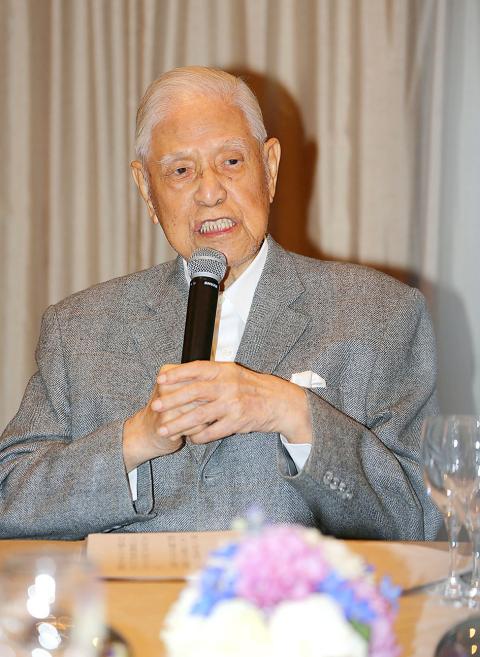China’s worst enemy is that it does not genuinely embrace democracy and freedom, and Taiwan, which does, will not be its enemy, former president Lee Teng-hui (李登輝) said on Sunday in Japan.
Lee made the remarks at a dinner gathering with Taiwanese expatriates in Okinawa, in which he said that Taiwan would someday present itself on world stage with its own name.
In the 21st century, China has become an assertive player on the economic, political, military and technological fronts, but it is seen as a hegemony, not a civilized country upholding the ideas of democracy and freedom, Lee said.

Photo: CNA
China has become the “most destabilizing factor” in Asia and has caused disturbances that threaten the security of countries in the region, he said.
Its ambitious Belt and Road Initiative — a scheme focused on investing large sums of money in infrastructure development in targeted countries — will turn many of the countries into “economic colonies of China,” he said.
An overbearing China is felt most keenly by Taiwan because China has more than 1,000 missiles targeted at Taiwan, frequently flown an array of military aircraft around Taiwan, lured away its diplomatic allies and obstructed its international participation, he said.
Economically, China has continued to steal technologies from Taiwan, offered lucrative packages to poach Taiwan’s human resources, and pressed Taiwanese businesspeople in China to give up their political beliefs in favor of China’s, Lee added.
China has also tried to build up its networks of operatives in Taiwan by offering money or using seduction to lure or disturb Taiwanese society, he said.
On one hand, China has coined the term “Chinese dream” to promote the idea of a “Greater China,” while on the other, it has employed the so-called “1992 consensus” to uphold its “one China” principle to suppress the development of Taiwan, Lee said.
Beijing’s use of a variety of tactics, including verbal intimidation, military threats, economic coercion, social division and bribery are aimed at annexing Taiwan to realize its dream of unification, he said.
“We are not afraid of China’s deliberate efforts to degrade Taiwan. Deep down in our hearts, we cannot degrade ourselves,” Lee said.
Some people, who are trapped by the idea of a “Greater China,” have become lost, not knowing where to go or what to do, Lee said, adding that they have succumbed to Chinese hegemony and are bought off by China for short-term interests.
Lee criticized the Chinese regime of running counter to the universal human value of democracy and freedom, projecting itself as a country of great power and prosperity.
He accused China of using the “Chinese dream” to fool Chinese citizens in order to maintain the Chinese Communist Party’s grip on power, Lee said.
“Taiwan is not your enemy, not now and not in the future. Your greatest enemy is true democracy and true freedom,” the former president said.
The Chinese government should think about building permanent democracy and freedom, and seeking eternal happiness for all Chinese people, he said.
If China wants to become a world power, it could not achieve this by exporting hegemony; instead, it should strive to be a civilization that exports universal values, Lee said.

An essay competition jointly organized by a local writing society and a publisher affiliated with the Chinese Communist Party (CCP) might have contravened the Act Governing Relations Between the People of the Taiwan Area and the Mainland Area (臺灣地區與大陸地區人民關係條例), the Mainland Affairs Council (MAC) said on Thursday. “In this case, the partner organization is clearly an agency under the CCP’s Fujian Provincial Committee,” MAC Deputy Minister and spokesperson Liang Wen-chieh (梁文傑) said at a news briefing in Taipei. “It also involves bringing Taiwanese students to China with all-expenses-paid arrangements to attend award ceremonies and camps,” Liang said. Those two “characteristics” are typically sufficient

A magnitude 5.9 earthquake that struck about 33km off the coast of Hualien City was the "main shock" in a series of quakes in the area, with aftershocks expected over the next three days, the Central Weather Administration (CWA) said yesterday. Prior to the magnitude 5.9 quake shaking most of Taiwan at 6:53pm yesterday, six other earthquakes stronger than a magnitude of 4, starting with a magnitude 5.5 quake at 6:09pm, occurred in the area. CWA Seismological Center Director Wu Chien-fu (吳健富) confirmed that the quakes were all part of the same series and that the magnitude 5.5 temblor was

The brilliant blue waters, thick foliage and bucolic atmosphere on this seemingly idyllic archipelago deep in the Pacific Ocean belie the key role it now plays in a titanic geopolitical struggle. Palau is again on the front line as China, and the US and its allies prepare their forces in an intensifying contest for control over the Asia-Pacific region. The democratic nation of just 17,000 people hosts US-controlled airstrips and soon-to-be-completed radar installations that the US military describes as “critical” to monitoring vast swathes of water and airspace. It is also a key piece of the second island chain, a string of

The Central Weather Administration has issued a heat alert for southeastern Taiwan, warning of temperatures as high as 36°C today, while alerting some coastal areas of strong winds later in the day. Kaohsiung’s Neimen District (內門) and Pingtung County’s Neipu Township (內埔) are under an orange heat alert, which warns of temperatures as high as 36°C for three consecutive days, the CWA said, citing southwest winds. The heat would also extend to Tainan’s Nansi (楠西) and Yujing (玉井) districts, as well as Pingtung’s Gaoshu (高樹), Yanpu (鹽埔) and Majia (瑪家) townships, it said, forecasting highs of up to 36°C in those areas